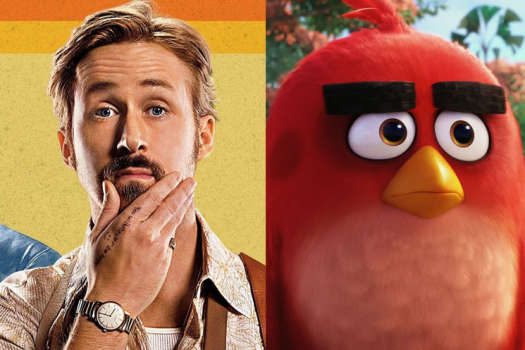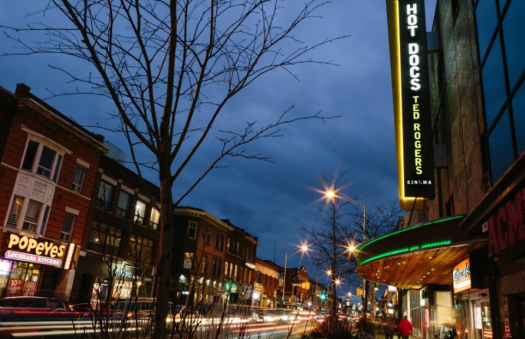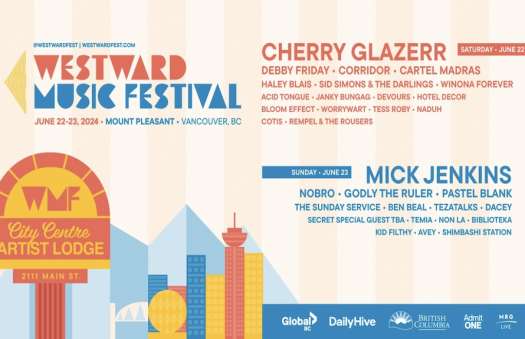In March, Netflix released James Acaster's Repertoire, a fittingly titled series that introduced the world outside of the U.K. to James Acaster and his dazzling display of comedic tools. Across a remarkable four hours of standup, Acaster oscillates at will between his comedic instruments, showcasing a stunning ability to buoy the narrative structure of a character-driven show with absurdist premises, precise observational riffs, inimitable slapstick and even a few rare, yet incisive political takes.
With so much going on tonally, you'd be forgiven for thinking that the show sounds like a complete mess, and yet Acaster miraculously pulls it all together into a cohesive body of work, creating something that is truly unique.
For his part, Acaster would like to remind everyone that this is not an effortless process. "Every time you see someone you like and it's your sense of humour — especially if it's filmed and the audience in that room likes it as well — it's very natural to think, 'Oh, this must always work!,'" the comic tells Exclaim!
Humility aside, this is actually much less common of a takeaway than Acaster seems to be suggesting. Of course, the opposite is often true — audiences will sometimes watch a comedy special and wonder how the comic in question ever got past the club stage of their career — but rarely do they think "this performer appears to possess such a profound faculty over their craft that it's hard to imagine them ever bombing."
In Acaster's case specifically, this latter takeaway seems plausible. The way his act is constructed at present, it's easy to appreciate why he thinks it's "just not everyone's cup of tea," but presumably, a less ambitious version of him could easily string together a series of his sharpest observational bits and tour them widely to a standing ovation each night. Luckily for us, however, this seems to be something he has little interest in. "If you are trying to improve as a comic, you are always going to die [on stage], because the stuff that you're trying to do is just a little bit out of reach ability-wise and you have to improve in order to get there."
Though he's inclined to politely deflect compliments, it's a challenge he's taking on once again with his new show, Cold Lasagne Hate Myself 1999.
"This show is all true. It's all stuff that's actually happened to me. It's about the best year of my life and the worst year of my life: 1999 and 2017 respectively. It's about why one was so great and why one was so awful, and about feeling alone and feeling connected to people. I'm really enjoying doing something that is a bit of a departure and a different kind of show, even if it's still very much my sense of humour."
Instinctively, Acaster seems to understand that this is something audiences want to see from him, detailing in a different part of the interview the various ways in which his character-based comedy hasn't always resonated universally.
"If it's not your sense of humour, it's quite hard to get on board with. Especially because I'm not just being a straightforward version of myself. If people leave the house wanting to see a comedian, they want to see someone speak out for themselves and share true stories from their life. And then I go on stage and I kneel down and start saying that I'm an undercover cop — they get a bit annoyed, like 'This isn't what I wanted from the evening!'"
Still, to describe this passively as "a bit of a departure" is to underplay it. Reflecting back on Repertoire, Acaster conspicuously sidesteps these sorts of direct confessions across all four episodes, opting to wholly inhabit his quirky on-stage persona, constructing an alternate reality and couching any and all personal sentiments within elaborate metaphors. Suggesting at one point that maintaining this persona consistently was the glue that helped him reconcile the many conflicting tones he had to balance across Repertoire, it'll be interesting to see what his act looks like once he drops this facade a little.
It speaks to how richly drawn Acaster's on-stage persona is that the absence of this personal touch was not felt all that strongly to begin with. His new hour, however different it may be from the previous four, is likely to feel more like the next logical step in Acaster's evolution as a performer, rather than a complete overhaul of his toolkit entirely.
James Acaster is performing at the JFL42 Festival in Toronto from September 20 to September 24; you can find tickets here.
With so much going on tonally, you'd be forgiven for thinking that the show sounds like a complete mess, and yet Acaster miraculously pulls it all together into a cohesive body of work, creating something that is truly unique.
For his part, Acaster would like to remind everyone that this is not an effortless process. "Every time you see someone you like and it's your sense of humour — especially if it's filmed and the audience in that room likes it as well — it's very natural to think, 'Oh, this must always work!,'" the comic tells Exclaim!
Humility aside, this is actually much less common of a takeaway than Acaster seems to be suggesting. Of course, the opposite is often true — audiences will sometimes watch a comedy special and wonder how the comic in question ever got past the club stage of their career — but rarely do they think "this performer appears to possess such a profound faculty over their craft that it's hard to imagine them ever bombing."
In Acaster's case specifically, this latter takeaway seems plausible. The way his act is constructed at present, it's easy to appreciate why he thinks it's "just not everyone's cup of tea," but presumably, a less ambitious version of him could easily string together a series of his sharpest observational bits and tour them widely to a standing ovation each night. Luckily for us, however, this seems to be something he has little interest in. "If you are trying to improve as a comic, you are always going to die [on stage], because the stuff that you're trying to do is just a little bit out of reach ability-wise and you have to improve in order to get there."
Though he's inclined to politely deflect compliments, it's a challenge he's taking on once again with his new show, Cold Lasagne Hate Myself 1999.
"This show is all true. It's all stuff that's actually happened to me. It's about the best year of my life and the worst year of my life: 1999 and 2017 respectively. It's about why one was so great and why one was so awful, and about feeling alone and feeling connected to people. I'm really enjoying doing something that is a bit of a departure and a different kind of show, even if it's still very much my sense of humour."
Instinctively, Acaster seems to understand that this is something audiences want to see from him, detailing in a different part of the interview the various ways in which his character-based comedy hasn't always resonated universally.
"If it's not your sense of humour, it's quite hard to get on board with. Especially because I'm not just being a straightforward version of myself. If people leave the house wanting to see a comedian, they want to see someone speak out for themselves and share true stories from their life. And then I go on stage and I kneel down and start saying that I'm an undercover cop — they get a bit annoyed, like 'This isn't what I wanted from the evening!'"
Still, to describe this passively as "a bit of a departure" is to underplay it. Reflecting back on Repertoire, Acaster conspicuously sidesteps these sorts of direct confessions across all four episodes, opting to wholly inhabit his quirky on-stage persona, constructing an alternate reality and couching any and all personal sentiments within elaborate metaphors. Suggesting at one point that maintaining this persona consistently was the glue that helped him reconcile the many conflicting tones he had to balance across Repertoire, it'll be interesting to see what his act looks like once he drops this facade a little.
It speaks to how richly drawn Acaster's on-stage persona is that the absence of this personal touch was not felt all that strongly to begin with. His new hour, however different it may be from the previous four, is likely to feel more like the next logical step in Acaster's evolution as a performer, rather than a complete overhaul of his toolkit entirely.
James Acaster is performing at the JFL42 Festival in Toronto from September 20 to September 24; you can find tickets here.




